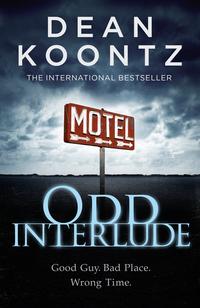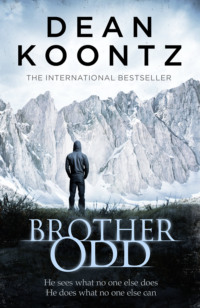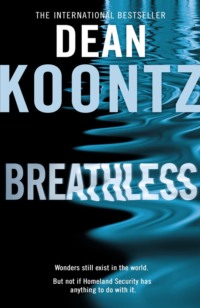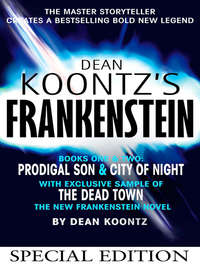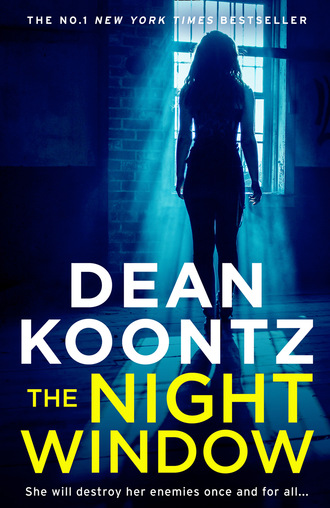
Полная версия
The Night Window
“Brownian movement,” he explains, “is progress by random motion. It’s one of nature’s primary mechanisms, Tom. The easiest way to explain is with the example of ribosomes, those tiny mitten-shaped organelles that exist in enormous numbers in the cytoplasm of human cells. They manufacture proteins.”
When his host pauses for wine, Buckle appears to be dazzled when he says, “Man, you’ve really worked this story out in detail.”
Hollister can feel his blue eyes twinkling with merriment, and he knows his captivating smile has never served him better. “Only because I so very much want you to be part of this, to sign on for this adventure with me. Now, ribosomes. Each one has more than fifty different components. If you break down thousands of ribosomes into their individual components and thoroughly mix them in a suspending fluid, then they ricochet off the molecules of the suspending medium and keep knocking against one another until one by one the fifty-some parts come together like puzzle pieces and, amazingly, assemble into whole ribosomes again. That is Brownian movement. It works with Bertold Shenneck’s control mechanism because each of the components is designed to fit in only one place, so the puzzle can’t assemble incorrectly.”
“‘Shenneck’?” Buckle asks.
Hollister should not have mentioned Shenneck, who had in fact invented the nanoweb implant. Now he covers his slip of the tongue. “As I was working this out, I needed to name some characters. That’s just what I call the scientist who developed the nanoweb implant.”
“It’s a good name for the character, but …” The director frowns. “It sounds a little familiar. We should check it out, make sure there’s not a prominent Bertold Shenneck out there anywhere.”
Hollister dismisses the issue with a wave of one hand. “I’m not wedded to the name. Not at all. You’re better than I am at this.”
Having finished his salad, the director blots his mouth on his napkin. “So how long does it take this brain implant to assemble once it’s been injected?”
“Maybe eight or ten hours with the first-generation implant, but the device will be improved, so it might be brought down to, say, four hours. The subject has no memory of being restrained and injected. Once the control mechanism is in place, his mind can be accessed with a key phrase like ‘Play Manchurian with me.’ Once accessed, he’ll do anything he’s told to do—and think he’s acting of his own volition.”
The key phrase delights Buckle. “That great Cold War movie about brainwashing. The Manchurian Candidate. John Frankenheimer directed from a Richard Condon novel. Sinatra and Laurence Harvey. Angela Lansbury as Harvey’s power-mad mother. About 1962, I think.”
“Shenneck liked his little jokes. The scientist character. Whatever we’re going to call him.”
“My head is swimming, Wayne, but in a good way. I’m really getting into the whole concept. But exactly how does this tie to Jane Hawk, where we started?”
Responding to the call button, Mai-Mai enters to remove the salad plates.
Hollister says, “Just imagine, Tom, that these Techno Arcadians are intent not only on repressing the unruly masses by injecting and controlling selected leaders in politics, religion, business, and the arts. They also want to prevent charismatic individuals with wrong ideas from influencing the culture.”
Tom smiles at Mai-Mai and then responds to his host. “What wrong ideas?”
“Any ideas in disagreement with Arcadian philosophy. Let’s say it’s been decided that controlling these charismatic types isn’t enough, that it’s necessary to remove their unique genomes from society, prevent them from propagating. So they receive a brain implant and are later directed to commit suicide.”
Tom Buckle nods. “Like Jane Hawk’s husband. But how would these people be chosen for elimination?”
“A computer model identifies them by their public statements, beliefs, accomplishments. Then they’re put on the Hamlet list.”
“‘Hamlet’? Why Hamlet?”
“The theory is that if someone had killed Hamlet in the first act, a lot more people would have been alive at the end.”
Frowning, Tom Buckle says, “For the movie, we’d probably have to call it something other than the Hamlet list. Anyway, how many people would be on this list?”
“Let’s imagine the computer model says that, in a country as large as ours, two hundred and ten thousand of the most charismatic potential leaders in each generation would have to be removed at the rate of eight thousand four hundred a year.”
“Mass murder. This is a very dark movie, Wayne.”
“To the Arcadians, it’s not murder. They think of it as culling from the herd any individuals with dangerous potential, a necessary step toward peace and stability.”
Mai-Mai returns with the entrée: sea bass, asparagus, and miniature buttered raviolis stuffed with mascarpone and red peppers.
Conversation throughout the main course focuses on what changes to make in the lead character and possible twists and turns in the story line. Hollister mentions the “whispering room,” a feature of the brain implants, by which adjusted people are able to communicate with one another via microwave transmission, brain to brain, as Elon Musk, of Tesla and Space X fame, has predicted will eventually be possible. They have the potential of forming a hive mind. The idea delights Buckle. Hollister enjoys this blue-sky session far more than he would if he were actually going to finance a motion picture.
Movies are terrible investments. Perhaps three out of ten make a profit. And there are countless ways that the distribution company can massage the box office numbers and pad the costs, so when there is a profit, much of it disappears.
However, Tom is bright and enthusiastic. Inventing this movie with him is a pleasure. The more the young man talks, the clearer it becomes that the computer model was right to put him on the Hamlet list, and it is good that he will be dead by dawn.
When Mai-Mai returns to remove their plates, Hollister says, “The time has come for you to do as we discussed.”
She meets his stare, and though she is submissive, she is also afraid. Her lips part as if she will speak, but instead of words, her voluptuous mouth produces only tremors.
As she stands beside her master’s chair, Hollister takes one of her hands in both of his, and he smiles reassuringly. He speaks to her as he might to a daughter. “It’s all right, child. It’s just a moment of performance art. You have always excelled as an artist. This is what you were born to do.”
Her fear abates. The tremor fades. She answers his smile with an affectionate smile of her own. She bends down to kiss his cheek.
Tom Buckle watches with evident perplexity. When Mai-Mai leaves the room with their plates, the filmmaker is at a loss for words and covers his uncertainty by taking a sip of wine and savoring it.
“I see you’re curious about Mai-Mai,” Hollister says.
“No, not at all,” Buckle demurs. “It’s none of my business.”
“In fact, Tom, it’s the essence of your business here. Mai-Mai is twenty-seven, a year older than you, an exceptional woman.”
Tom glances toward the swinging door through which Mai-Mai left the room. “She’s quite beautiful.”
“Quite,” Hollister echoes. “She’s also supremely talented. Her paintings redefine realism. They’re stunning. By the time she was twenty-two, she’d won numerous awards. By the time she was twenty-four, her work was represented by the most prestigious galleries. She broke new ground as well by combining several of her larger paintings with a unique form of performance art that began to draw enthusiastic crowds.”
“Does she still paint?”
“Oh, yes. Better than ever. Magnificent images exquisitely rendered.”
“Then why …”
“Why is she here serving us lunch?”
“I can’t help but wonder.”
“She creates paintings but doesn’t sell them anymore.”
“You sure know how to build mystery, Wayne.”
Hollister smiles. “I’ve intrigued you, have I?”
“Greatly. I’d love to see these paintings.”
“You can’t. After she finishes a new canvas, she destroys it.”
Bafflement creases Tom Buckle’s brow. “Whyever would she do such a thing?”
“Because she’s an adjusted person. She made the list.”
This incident with Mai-Mai has disoriented Tom just enough so that the word list has no immediate meaning for him.
“The Hamlet list,” Hollister explains.
Puzzlement gives way to misunderstanding, and Tom smiles. “You give one hell of a pitch meeting, Wayne. And she’s quite an actress.”
“She’s not an actress,” Hollister assures him. “She’s just an obedient little bitch. She destroys them because I tell her to.”
Just then Tom Buckle’s gaze shifts from his host to the wall of glass behind him. “What on earth …?” Tom rises from his chair.
Wainwright Hollister gets to his feet as well and turns to the window.
Mai-Mai stands naked on the terrace, in the swiftly falling snow, facing them and smiling serenely, seeming more mystical than real.
“Her body is as perfect as her face,” says Hollister, “but one can grow tired even of such perfection. I’ve had enough of her.”
A scarlet silk scarf drapes Mai-Mai’s right hand. It slides to the snow-carpeted terrace, revealing a pistol.
“Performance art,” Tom Buckle tells himself, for he is both confused and in denial.
Soundlessly snow falls and falls, cascades of white petals, as Mai-Mai puts the barrel of the gun in her mouth and seems to breathe out the dragon fire of muzzle flash, seems to fold to the terrace in slow motion, the flowerfall of snow settling silently on her silent corpse.
8
Jane raised the lower sash of a double-hung window.
A foot below the windowsill, running nearly the width of the building, a five-foot-wide cantilevered marquee overhung the public sidewalk, the front of it bearing the name of the closed photography studio.
She dropped her tote onto the lid of the marquee and followed it through the window.
The entire block was from the Art Deco period, and each of the shared-wall buildings had its own stylized marquee, each separated from the next by a two-foot-wide gap. Jane hurried eastward, sprang from that first projection onto a second, from the second onto a third.
With the tote slung over her left shoulder, she knelt on the edge of the third marquee, facing the building, gripped the decorative masonry cornice, and slid backward into empty air, hanging by her hands for a moment before dropping to the sidewalk.
She startled an old guy in a tam-o’-shanter and walking with a three-footed cane. “Pretty girls falling from the sky!” he declared. “These are days of miracles and wonder.”
In the drop, her tote had slid off her arm. She snared it from the sidewalk.
“If only I were fifty years younger,” he said.
Jane said, “If only I were fifty years older,” kissed him on the cheek, stepped between two parked cars, and dodged across three lanes of traffic.
From the farther side of the street, she looked back and saw the man in the dark raincoat at the open window through which she had exited the building, and below him another man venturing forth from the recessed entryway to the former photography studio. They both had spotted her.
At the corner, she turned north, out of their sight. Ahead, a thirtysomething guy was preparing to climb onto a fully chromed Harley Road King cruiser. His open-face helmet boasted an American flag decal. She hoped it meant something to him.
Breathless, she said, “Give a girl a ride?”
He didn’t look her up and down as men usually did, only met her eyes. “Where you going?”
“Anywhere but here. And fast.”
“Cops or not cops?”
She had to give him something to win cooperation. “Maybe they carry a badge, but it’s bogus.”
As he swung aboard the saddle, he said, “Climb on and hold tight.”
She sat just forward of the saddlebags, tote straps over one shoulder, arms around him.
The motor was hopped up, with the distinct sound of Screamin’ Eagle pistons and cylinders.
Jane glanced over her shoulder. One of her pursuers turned the corner.
The Road King shot away from the curb.
9
The sky unseen behind the raveling white skeins with which it cocooned the world, and on the terrace Mai-Mai’s once lovely form stiffening under a crystalline lacework …
This side of the windows, Tom Buckle repeats, “Performance art,” though the artist is not going to stand up, bloodied and brainless, to take a bow.
Adam, Brad, and Carl, the three most senior members of the ranch’s eighteen-man security force, who once had other names and personalities and real lives, enter the breakfast room. They are dressed in black, with the Crystal Creek Ranch logo in white stitching on the breast pockets of their shirts.
Although Tom Buckle still regards the suicide of Mai-Mai with stunned disbelief, he at once responds to these three men with fear and alarm, as well he should. They have the intensity of wolves on the hunt, and though their stares are as sharp as filleting knives, there is a deadness in their eyes that implies, quite accurately, that they are as coldhearted as machines.
“Tom,” Hollister says in a tone of voice that suggests nothing out of the ordinary has occurred, “do you remember the name of the brainwashed assassin in The Manchurian Candidate?”
Tom eases away from the newcomers. “What is this? What the hell is happening here?”
In answer to his own question, Hollister says, “His name was Raymond Shaw. Specimens like these three”—he gestures toward the security agents—“we call rayshaws. One word. Lowercase r. They’re adjusted people, injected with a control mechanism. But this nanoweb is different from those administered to Mai-Mai and Nick Hawk and others on the Hamlet list. This version scrubs away their memories, every last one, deconstructs their personalities, and programs them to be bodyguards who, without hesitation, will give their lives for their master. I am their master, Tom, and if I tell them to kill you, they will do so with extreme prejudice.”
The film director eases away from the rayshaws until he backs into a sideboard. He is physically rigid, but there is no doubt he’s reeling mentally and emotionally.
“Your work has earned you a place on the Hamlet list, Tom, and therefore a death sentence.”
The filmmaker dares to look away from the rayshaws and meet his host’s eyes. Although he is a screenwriter as well as a director, he is at a loss for words, perhaps struggling to make sense of this bizarre turn of events and plug it into a dramatic structure that promises him a triumphant resolution.
“I could order these men to subdue you and inject you and send you back to California with no knowledge of anything that has occurred here.”
Wainwright Hollister rounds the end of the table, approaching Tom Buckle.
“Do you know Roger and Jennifer Boseman?”
As if shell-shocked, Tom says, “What?”
“Roger and Jennifer Boseman?”
“They live next to me, neighbors, next door.”
“Their daughter Kaylee, ten years old. She’s quite a beautiful child. After you’re injected, adjusted, and sent home, if I call you in a few weeks and instruct you to kidnap Kaylee, rape her, torture her, kill her, and then kill yourself … you will obey.”
He comes face-to-face with his guest.
“After that outrage, the two acclaimed films you’ve made will be judged the work of a monster, withdrawn from distribution in all formats, never to be seen again. Whatever small effect you’ve thus far had on the culture will be erased.”
The director finally accepts what he desperately doesn’t want to believe. “Dear God, it’s real. The nanoweb, the injections, the enslavement.”
“Yes. But ‘enslavement’ is the wrong word, Tom. Most human beings are impetuous, imprudent, ignorant, given to superstition and other irrational behavior. They’re maladjusted. For their own sake and to preserve this fragile planet, we merely intend to adjust them.”
“You’re insane.”
“No, Tom. I’m the clearest-thinking person you’ll ever meet. I have no illusions about the meaning of life.”
Hollister favors the younger man with a kindly smile worthy of a country doctor in a painting by Norman Rockwell.
“I’m also a man of profound convictions. I don’t always leave the dirty work to others. Sometimes I do the adjusting myself. The adjusting or, as in your case, the extermination. But I am also a fair man, Tom. In the contest to come, you will have a chance to survive.”
As though inspired by countless moments of movie heroics, Tom Buckle throws a punch, but as ineptly as a supporting character who is playing a fool. Hollister blocks the blow with a forearm, seizes Buckle’s wrist, twists that arm up behind the man’s back, and shoves him hard. The director staggers into the window wall and slaps both palms against the glass to stop himself from crashing through.
To the rayshaws, Hollister says, “Mr. Buckle needs to be suited up and instructed as to the rules of the hunt.”
Just then the first wind of the storm invades the terrace, and the scarlet silk scarf, which once covered Mai-Mai’s pistol, billows off the snow-skinned flagstones and undulates six or seven feet above her corpse, as though it is her very spirit, risen from her hushed and cooling heart.
10
The twin-cam engine, maybe 95ci, gave the bike true zip. The driver worked the five-speed transmission with finesse and took hard corners with the confidence of a Star Wars character piloting an antigravity sled.
After an almost twenty-minute ride, he slowed in a residential neighborhood in a part of the valley far enough north that it didn’t qualify as a Los Angeles suburb. The houses were old, the properties large, the trees tall and plentiful, live oaks and eucalyptuses and all kinds of palms, some of them long left untrimmed.
He pulled into a driveway that ran alongside a meticulously maintained bungalow with craftsman details. The place was shaded by immense, well-kept phoenix palms.
At the back of the property stood a separate garage with three double-wide doors, one of which rose as the Harley approached. The driver coasted under the up-folding panels, stopped in the garage, killed the engine, and put down the kickstand.
Jane had been expecting him to drop her miles from where they started, but in a public place. Evidently he had brought her home instead. The three garage bays were deep and open to one another, housing a well-equipped machine shop and a number of motorcycles.
Wary not so much because he’d brought her here of all places, but because the world in its dark ways had woven wariness through her bones, she got off the Road King, alert for trouble.
He removed his helmet, put it on the bike seat, stripped off his driving gloves, combed his thick hair with one hand. Wide-set malachite eyes. Clean, strong features. The suggestion that a smile was imminent.
Jane said, “Thanks for the lift.”
He cocked his head to study her.
“But where are we, and how far do I have to hike to get a bus?”
A low growl drew her attention. An enormous dog stood at the open garage door. A mastiff with an apricot-fawn coat, black face, and sooted ears.
Mastiffs had a reputation as aggressive, which they weren’t—unless trained to be.
Her rescuer finally spoke. “You leaned in all the way, never tensed no matter how radical the rake.”
“I’ve ridden before.”
“Ridden or driven?”
“Both.”
Indicating the glowering dog, his master said, “Sparky’s harmless. No bark, no bite.”
“No wag, either.”
“Give him time. Maybe old Sparky knows you’re carrying a concealed weapon.”
“How would he know that?”
“Maybe the cut of your sport coat.”
“Your dog has street smarts.”
“Also, when you were holding tight and leaning in, I felt it against my back.”
She shrugged. “It’s a dangerous world. A girl’s got to look out for herself.”
“Too true. Anyway, I’ve got a solid bike for you.”
“I didn’t know I was in the market for one.”
“You were on foot, so they must’ve made your car.”
“‘They’?”
“The guys with bogus badges.”
“You brought me all the way here to sell me a bike?”
“I didn’t say sell.”
“I’m not going to work for it.”
“Stay cool. I’m way married. My wife’s in the house right now. She saw us drive up. Anyway, she’s all I need.”
Jane put down the tote bag to have both hands free. She glanced toward the house. Maybe the wife existed, maybe she didn’t. If she existed, perhaps she was insurance against an attempted assault—or maybe she was cool with rape and would even assist her husband. Jane had once taken down a serial killer whose wife charmed his targets into a sense of safety so they could be easily abducted; she cooked elaborate meals for the girls during the weeks that her husband used them, brought fresh flowers to their windowless basement prison, and assisted in the disposal of their broken bodies after hubby wearied of them. She said she did it because she loved him so much.
“Name’s Garret. Garret Nolan.”
“I’m Leslie Anderson,” she lied.
His face finally formed the smile that had been pending. There was a knowing quality to it, which disturbed Jane.
The mastiff had entered the garage. He intently sniffed her shoes as though to map the journey that had brought her here.
Garret Nolan went to a wall switch and clicked on the lights in all six vehicle stalls. “Racers, street cruisers, touring bikes. I break them down, build them better, customize them. If you need to get all the way to the Canadian border, you’ll want a bagger.”
From the Canadian border reference, she inferred that he had assumed more about her status as a fugitive than she’d given him reason to deduce. She felt the skin crepe on the back of her neck.
“I have two Road Kings,” he continued, “rebuilt slick, but I’ve got too much in them just to give them away. What I can give you is this 2012 Big Dog Bulldog Bagger, which I was going to tear down next. It’s a righteous bike.”
“You don’t have to give me anything. I have money. I can pay.”
“I won’t take your money. The Big Dog has a lot of miles on it, but it’s in good shape. I’ve ridden it myself. You don’t need it flashed up with Performance Machine wheels, Kuryakyn mufflers, and all the rest. It’s a reliable beast of burden and won’t call undue attention. Test ride it around the neighborhood. You like it, take it. There isn’t a license plate, but you could maybe go a couple thousand miles before a cop might notice.”
She stared at him in silence until his lingering half smile flatlined. Then she said, “I ask for a ride out of a tight spot, and you want to give me a bike. What’s this about, Mr. Nolan?”
He shrugged. “I believe you. I want to help.”
“Believe me about what?”
“That you’re innocent.”
“I never said I was innocent. Anyway … innocent of what?”
He was a big guy, about six feet two and solid, with an air of rough experience about him, and yet he suddenly seemed as shy as a boy, looking down at his shoes to avoid meeting her eyes.
“Innocent of what?” she pressed.
He gazed through the open door, at the house shaded by phoenix palms, at the still cascades of fronds in the warm, breathless day.
She waited, and when he looked at her again, he said, “That’s a bitchin’ disguise, but seeing through disguises was part of my job. You’re her. You’re Jane Hawk.”
11
Sparky, the mastiff, sniffed along the zipper of the tote bag, as though trained to locate the banded stacks of hundred-dollar bills that, among other things, it contained.



